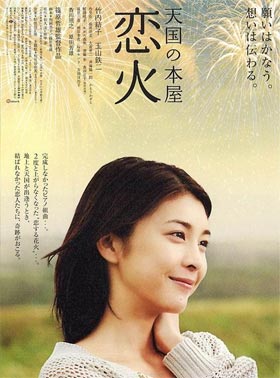|
|
|
|
|
|
|
Heaven's
Bookstore |
|
| |
|
review | availability | |

Availability:
DVD (Hong Kong)
Region 3 NTSC
Kam & Ronson
2-Disc Set
16x9 Anamorphic Widescreen
Japanese Language Track
Dolby Digital 5.1 / DTS ES
Removable English and Chinese subtitles
Various extras

|
|
Year: |
2004 |
|
Director: |
Tetsuo
Shinohara |
|
Cast: |
Yuko
Takeuchi, Tetsuji Tamayama, Teruyuki Kagawa, Yoshio
Harada |
|
The
Skinny: |
An
easy breezy meditation of life before and after death,
Heaven's Bookstore features some nice scenery
and a star performance by Yuko
Takeuchi. Those looking for a ponderous film that requires
hard thinking and a long discussion may want to apply
elsewhere. |
|
Review
by
Kevin Ma: |
Does
love go beyond the span of a human life? Can true love
exist even in heaven? Where do we go after we die? These
are some of the questions Heaven's Bookstore,
an adaptation of not just one, but two bestselling Japanese
novels, tries to answer. Heaven's Bookstore combines
a fantasy involving life in heaven with a simple drama
about characters searching for redemption for lost love
on earth. As heavy as the subject matters seem, the
film manages to be touching and lighthearted enough
that everything goes down easier despite being somewhat
simplistic.
Heaven's Bookstore
opens with Kenta (Tetsuji Tamayama), a failing classical
pianist, being brought to heaven by Yamaki (Yoshio Harada)
to work in a bookstore where books are read aloud to
customers. Apparently, each person has a 100-year lifespan,
and if a person dies before they reach 100 years of
age, the rest of their years are spent in heaven waiting
for reincarnation. However, Kenta isn't dead, he's just
there as a part-time worker for some unknown reason
(which is only slightly hinted at towards the end of
the film). One day, Shoko (Yuko Takeuchi) goes to the
bookstore and Kenta immediately recognizes her as the
pianist who inspired him to play the piano as a child.
Kenta and Shoko become friends,
and inspired by Kenta's passion, Shoko begins to teach
him how to master the piano - though Shoko, who is deaf
in one ear cannot play the piano herself. In return,
Kenta helps Shoko complete the unfinished piano piece
she was working on before her death. Meanwhile, Shoko's
niece Kanako (in a Love Letter-style twist, Kanako
is also played by Yuko Takeuchi) tries to revive the
town fireworks show for the first time in over 12 years.
The show features Wabi, a type of Japanese fireworks
also known as the "Loving Fireworks", which
made the shows legendary at one time. But Kanako has
to first convince the talented fireworks craftsman Takimoto
(Teruyuki Kagawa), the only man in the region who can
make Wabi, to come out of retirement, plus get over
his guilt from the accident 13 years ago that left Shoko
deaf in one ear.
Instead of filling the
film with special effects and clever twists to tie the
two plots together, director Tetsuo Shinohara combines
the two simple stories by not concentrating on any intricate
plotting or the logistics of heaven (apparently Japanese
is the official language of heaven and it looks conspicuously
like Hokkaido in springtime). Instead, he focuses on
his characters and their individual dilemmas. Heaven's
Bookstore doesn't strive to resolve all the questions
one would have about life and death, and instead presents
a cast of characters that tries to leave their pasts
behind. While not all the characters are equally compelling,
Shinohara does make sure that the audience cares about
them enough that the touching moments of the film work.
However, the pleasantness of the proceedings means the
film never manages to elevate itself beyond light entertainment
to a work that would at least stir philosophical discussion.
The performances are surprisingly
mixed. Tetsuji Tamayama fails to step up as the leading
man by looking lost instead of inspired, and Teruyuki
Kagawa overplays his tormented Takimoto in the emotional
scenes, making him seem more crazed than regretful.
On the other hand, Yuko Takeuchi convincingly plays
the two central characters with class, creating two
distinct personalities and goals - one trying to move
on from the past, and the other trying to revive it.
Takeuchi's ability to convey the various emotions of
the two characters makes this a true star performance.
While Heaven's Bookstore
features some beautiful people, nice scenery, and emotional
moments that might even bring a tear or two, it's definitely
not a romance at heart. A few of the major characters
do long for romantic love, but love in Heaven's Bookstore
is really about love for family, for life, for nostalgia,
and even for piano playing. That is perhaps the best
thing about Heaven's Bookstore; Shinohara didn't
need to give the film unrealistic romantic moments (especially
where any romance between Shoko and Kenta - considering
the 20-year age difference in their characters - would
seem creepier than touching.) and kept the characters
true to their nature. While the film's failure to turn
the heaven idea to something beyond a simple gimmick
will probably draw some criticism, those looking for
a sweet and simple film for a weekend afternoon will
find that the simplicity of the plot works just fine.
(Kevin Ma 2006) |
|
|
|
|
|
|
|
|
|
|
|
|
| LoveHKFilm.com
Copyright ©2002-2017 Ross Chen
|
|
|